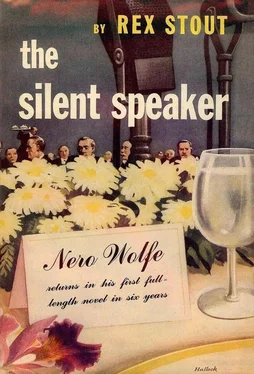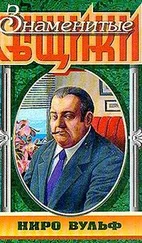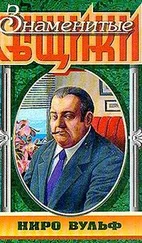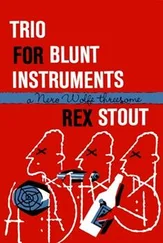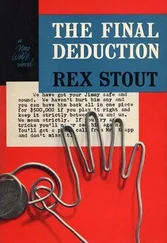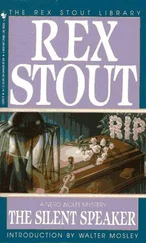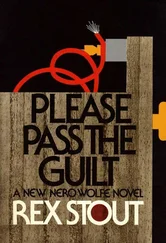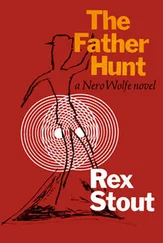Mrs. Boone looked at me, and I had the uncomfortable feeling that she was trying to find some sort of resemblance to her dead husband, he being gone and therefore no longer available for important decisions. I thought it might possibly help if I nodded at her reassuringly, so I did. Whether that broke the tie or not I don’t know, but something did, for she spoke to Wolfe:
“She knew who killed my husband. My husband told her something that day when he gave her the leather case, and she knew from that, and also he had dictated something on one of those cylinders that told about it, so the cylinder was evidence, and she had it. She was keeping it and she intended to give it to the police, but she was waiting until the talk and the rumors and the public feeling had done as much damage as possible to the NIA. She told me about it because I went to her and told her I knew she wasn’t telling the truth about that leather case, I knew she had had it with her at the table in the dining room, and I wasn’t going to keep still about it any longer. She told me what she was doing so I wouldn’t tell the police about the case.”
“When was that? What day?”
She thought a moment, the crease deepening in her forehead, and then shook her head uncertainly. “The days,” she said. “The days are all mixed up.”
“Of course they are, Mrs. Boone. It was Friday evening when you were here with the others the first time, when you almost spoke up about it and changed your mind. Was it before that, or after?”
“It was after. It was the next day.”
“Then it was Saturday. Another thing that will help you to place it, Saturday morning you received an envelope in the mail containing your wedding picture and automobile license. Do you remember that? It was the same day?”
She nodded with assurance. “Yes, of course it was. Because I spoke of that, and she said she had written a letter to him — to the man who killed my husband — she knew my husband had always carried the wedding picture in the wallet that was missing — he had carried it for over twenty years — twenty-three years—”
The widow’s voice got away from her. She gave it up and gulped, sat without trying to go on, and gulped again. If she lost control completely and started noises and tears there was no telling what Wolfe would do. He might even have tried to act human, which would have been an awful strain on all of us. So I told her gruffly:
“Okay, Mrs. Boone, take your time. Whenever you get ready, what did she write a letter to the murderer for? To tell him to send you the wedding picture?”
She nodded and got enough voice back to mumble, “Yes.”
“Indeed,” Wolfe said to help out.
The widow nodded again. “She told me that she knew I would want that picture, and she wrote him to say that she knew about him and he must send it to me.”
“What else did she write him?”
“I don’t know. That’s all she told me about it.”
“But she told you who he was.”
“No, she didn’t.” Mrs. Boone halted again for a moment, still getting her voice back into place. “She said she wouldn’t tell me about that, because it would be too much to expect me not to show that I knew. She said I didn’t need to worry about his not being punished, there would be no doubt about that, and besides it would be dangerous for me to know. That’s where I now think I did wrong — that’s why I said I’m responsible for her death. If it would have been dangerous for me it was dangerous for her, especially after she wrote him that letter. I should have made her tell the police about it, and if she wouldn’t do it I should have broken my promise to her and told the police myself. Then she wouldn’t have been killed. Anyway she said she thought she was breaking a law, withholding information and concealing evidence, so I have that on my mind too, helping her break a law.”
“You can stop worrying about that, at least,” Wolfe assured her. “I mean the lawbreaking. That part of it’s all right. Or it will be, as soon as you tell me, and I tell the police, where Miss Gunther put the cylinder.”
“But I can’t. That’s another thing. I don’t know. She didn’t tell me.”
Wolfe’s eyes had popped wide open. “Nonsense!” he said rudely. “Of course she told you!”
“She did not. That’s one reason I came to see you. She said I didn’t need to worry about the man who killed my husband being punished. But if that’s the only evidence...”
Wolfe’s eyes had gone shut again. There was a long silence. Mrs. Boone looked at me, possibly still in search of a resemblance, but whatever she was looking for her expression gave no indication that she was finding it. Finally she spoke to Wolfe again:
“So you see why I need advice...”
His lids went up enough to make slits. In his place I would at least have been grateful for all the corroboration of the guesses I had made, but apparently he was too overcome by his failure to learn where the cylinder was.
“I regret, madam,” he said, without any noticeable tremor of regret or anything like it, “that I can’t be of any help to you. There is nothing I can do. All I can give you is what you said you came for, advice, and you are welcome to that. Mr. Goodwin will drive you back to your hotel. Arriving there, telephone the police immediately that you have information for them. When they come, tell them everything you have told me, and answer their questions as long as you can stand it. You need have no fear of being regarded as guilty of lawbreaking. I agree with you that if you had broken your promise to Miss Gunther she would probably not have been killed, but it was she who asked you for the promise, so the responsibility is hers. Besides, she can afford it; it is astonishing, the burden of responsibility that dead people can bear up under. Dismiss that from your mind too if you can.” He was on his feet. “Good afternoon, madam.”
So I did get to drive a female Boone home from our office, though not Nina. Since it appeared that she had given us all she had and was therefore of no further immediate interest, I didn’t even bother to discover whether anyone was on her tail and confined myself to the duties of a chauffeur. She didn’t seem to care about conversing, which simplified matters. I delivered her safely at the Waldorf entrance and headed back downtown. Aside from the attention to driving, which was automatic, there was no point in trying to put my mind on my work, since I was being left out in the cold and therefore had no work, so I let it drift to Phoebe Gunther. I went back to the times I had been with her, how she had talked and acted, with my present knowledge of what she had been doing, and decided she had been utterly all right. I have an inclination to pick flaws, especially where young women are concerned, but on this occasion I didn’t have the list started by the time I got back home.
Wolfe was drinking beer, as I observed when I stepped inside the office door merely to tell him:
“I’ll be upstairs. I always like to wash my hands after I’ve been with certain kinds of policemen, meaning Inspector Ash, and I’ve—”
“Come in here. That letter and check. We’d better get that done.”
I gawked. “What, to the NIA?”
“Yes.”
“My God, you don’t mean you’re actually going to send it?”
“Certainly. Didn’t I tell that woman I would? Wasn’t it with that understanding that she told me things?”
I sat down at my desk and regarded him piercingly. “This,” I said sternly, “is not being eccentric. This is plain loony. What about Operation Payroll? And where did you suddenly get a scruple? And anyway, she didn’t tell you the one thing you wanted to know.” I abruptly got respectful. “I regret to report, sir, that the checkbook is lost.”
Читать дальше
